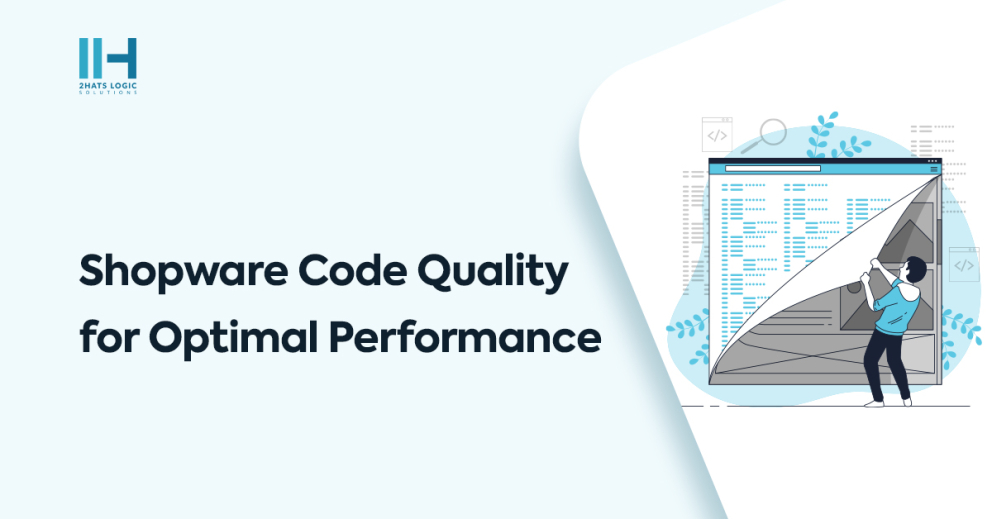Greetings! I'm Aneesh Sreedharan, CEO of 2Hats Logic Solutions. At 2Hats Logic Solutions, we are dedicated to providing technical expertise and resolving your concerns in the world of technology. Our blog page serves as a resource where we share insights and experiences, offering valuable perspectives on your queries.

Just as a strong foundation ensures the safety and longevity of a home, high-quality code underpins the reliable and efficient software we use every day. Our commitment to code quality is about building robust and secure digital ‘homes’ for our clients’ software needs. We employ a blend of meticulous craftsmanship, cutting-edge tools, and continuous learning to ensure that the software we create, not only follows the best practices for Shopware development but is also user-friendly, secure, and durable. It’s important to write code that not only works today but will also work well in the future and be easy to update.
Assess Your Code Quality with Us
Let’s explore in detail how we carefully ensure the quality of our code.
Training and Continuous Learning: Upholding Excellence in Code Craftsmanship
We are committed to continuous learning and improvement. We use a variety of time-tested methods to stay up-to-date on the latest technologies and trends, including regular training programs, industry conferences, and peer-to-peer learning. We believe that it’s important to be familiar with the Shopware code architecture to debug efficiently and write optimized code. We also believe in the power of collaboration, and we regularly hold group discussions and collaborative pair programming exercises.
Embracing SOLID Principles: Our developers are trained in the SOLID programming principles, a set of guidelines designed for creating more understandable, flexible, and maintainable software. These principles guide our developers to write code that functions flawlessly and adapts effortlessly, like a well-oiled machine.
Guidance from the Industry Experts: We are inspired by thought leaders like Robert Martin, author of the seminal book Clean Code. Martin’s teachings on writing clean and efficient code are a cornerstone of our training programs and help us to craft code that is both functional and maintainable. We also enhance our skills through online learning platforms such as Shopware Academy, Vue Mastery, and others.
Adhering to PSR-2 Coding Standards: Ensuring that our code is consistent and clear is a top priority for us, which is why we adhere strictly to PSR-2 coding standards. Adhering to these guidelines is not just about following a set of rules; it’s about ensuring our code is uniform, which aids in team collaboration and enhances our clients’ confidence in the software we deliver.
Essential Code Quality Tools
In this section, we’ll talk about the tools we use to keep our code clean and efficient.
- A good code editor is key, and we choose VS Code because it’s one of the best out there. VS Code has a vast library of extensions, and most code improvement tools have VS Code extensions available. This makes VS Code a highly customizable and extensible editor, meeting the needs of a wide range of developers.
- AI tools do more than just speed up our coding process; they make it simpler to rework and understand code. Currently, we are using Codeium to assist with coding and refactoring, and we rely on Codacy for reviewing pull requests (PRs). These tools streamline our workflow, making coding more efficient and reviews more thorough.
- Static code analysis tools to automatically scan and analyze the source code before it is committed. We prefer PHPStan, which is also recommended by the shopware team.
Git and CI/CD Integration
Git is crucial for managing our code effectively. We use a feature branch workflow, which helps keep our tasks well-organized and simplifies scaling and debugging. For project management, Jira is our go-to tool, and we use Bitbucket for our code repository. They work together seamlessly, linking commits to their tasks and vice versa. We also use other tools like github and gitlab based on our client’s preferences.
We’re committed to frequent integration and deployment, so code reviews and merges are regular occurrences. This approach prevents the overwhelming task of reviewing vast amounts of code at once. To streamline this process, we utilize automated deployment tools like AWS CodeDeploy.
Manual code reviews
Manual code reviews are vital, as automated tools aren’t foolproof and can overlook errors that a human eye might catch. Therefore, this step is indispensable in our process.
A senior developer always reviews code line by line before merging it to the main branch. This ensures that only the highest-quality code is merged. We maintain a code quality checklist of critical issues to avoid, commonly known as code smells, to ensure our standards are met.
Below are a few common indicators of code issues, known as code smells:
Code Readability: If your code is hard for others to understand, it may need improvement. Consider renaming variables and functions for clarity or adding comments to explain complex logic.
Code Duplication: When you find repeated code, try to consolidate it into a new function. This also applies to complex conditions or regular expressions that appear frequently. Creating a helper class or function can prevent multiple updates later.
Nested Structures: Limit the use of nested if-else statements and loops. Aim to return early from functions and use built-in functions to simplify loops.
Function Length: If a function exceeds 100 lines, it might be doing too much. Apply the Single Responsibility Principle and break it into smaller functions or classes if needed.
Overburdened Classes: If a class is handling too many tasks, consider splitting it into multiple classes.
Coding Standards: Adhere to the PSR-2 guidelines and use tools like PHP CS Fixer. However, always double-check manually.
Spelling Accuracy: Ensure there are no spelling errors in your variables, function names, or class names. This is essential for maintaining professionalism and clarity.
Performance Optimization: Make sure there is no more room for speed improvement which could affect the store performance. Pay special attention to optimizing database queries for any additional speed enhancements.
Security
To conclude our discussion on code quality, let’s explore the security measures we implement to secure your shopware store. Ensuring our code is secure and resilient against vulnerabilities is critical.
Our security measures include a checklist to prevent common vulnerabilities:
- We ensure no sensitive information such as usernames, passwords, or keys are uploaded to our Git repositories.
- We protect all forms with CSRF tokens to block cross-site scripting attacks.
- We validate all user input to guard against SQL Injection.
- We implement IP rate limiting on critical pages to defend against denial-of-service attacks.
- We avoid sharing credentials through messaging platforms.
To ensure robust security in our software, we integrate the strategies from the previous four sections: through continuous training and learning, we stay updated on the latest security practices; our selection of quality assurance tools includes features that help detect vulnerabilities; and our manual code review process includes a thorough security audit by experienced developers. We ensure the security of our development process by thoroughly erasing the hard drive of any machine before it is reassigned to a different developer. This holistic approach is key to maintaining good code quality in shopware.

Related Articles







